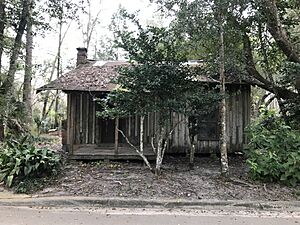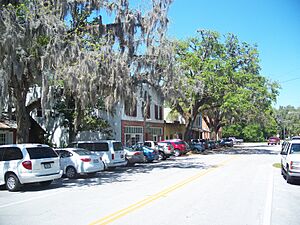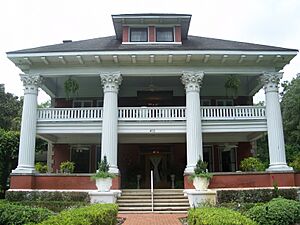Micanopy, Florida facts for kids
Quick facts for kids
Micanopy, Florida
|
|
|---|---|
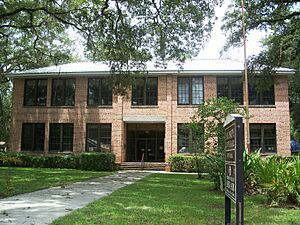
Micanopy Town Hall and Library
|
|
| Motto(s):
"The Town that Time Forgot"
|
|
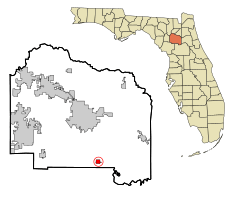
Location in Alachua County and the state of Florida
|
|
| Settled | 1821 |
| Incorporated | 1837 |
| Government | |
| • Type | Mayor-Commission |
| Elevation | 38 m (125 ft) |
| Population
(2020)
|
|
| • Total | 648 |
| Time zone | UTC-5 (Eastern (EST)) |
| • Summer (DST) | UTC-4 (EDT) |
| ZIP code |
32667
|
| Area code(s) | 352 |
| FIPS code | 12-45225 |
| GNIS feature ID | 0286767 |
Micanopy (pronounced MIK-ə-NOH-pee) is a small town in Alachua County, Florida. It is located south of Gainesville and is part of the Gainesville metropolitan area. In 2020, 648 people lived there.
Micanopy is special because it is the oldest town in inland Florida that has been continuously lived in. Its downtown area is known as the Micanopy Historic District. This district is listed on the National Register of Historic Places. The town has many antique shops, restaurants, a library, a fire station, and a post office. People sometimes call it "The Town that Time Forgot."
Contents
History of Micanopy
Early Native American Settlements
Long ago, in 1539, a Spanish explorer named Hernando de Soto found a village of the Timucua people near Micanopy. Later, in 1774, a naturalist named William Bartram visited the area. He wrote about a village called "Cuscowilla," which was an early Seminole settlement.
Founding of the Town
In 1821, Spain gave Florida to the United States. Micanopy then became the first official U.S. town in the Florida Territory. One of the first people to settle here was Moses Elias Levy. He was a rich Jewish businessman. He started a Jewish community called "Pilgrimage" nearby.
The town of Micanopy was built with help from the Florida Association of New York. The town was likely named after Chief Micanopy. This was done to show respect to the chief, who had original authority over the land.
Micanopy During the Seminole Wars
During the Second Seminole War, two forts were built in Micanopy. These were Fort Defiance (1835–1836) and Fort Micanopy (1837–1843). Some of the most intense battles of the war happened near Micanopy. Recent studies have found the locations of these forts. They also found two battlefields within the town: the Battle of Micanopy and the Battle of Welika Pond.
The Town of Micanopy officially became a municipality in 1837.
Growth with Railroads
Before the 1880s, goods like citrus from Micanopy were shipped by boat. They went across Lake Alachua to another shore. From there, they were taken by train. In 1883, the Florida Southern Railway built a train line to Micanopy. This helped farming in the area grow. By 1880, Micanopy had over 600 people. In the 1920s, cars started using the Micanopy Causeway to cross Paynes Prairie.
Geography and Climate
Where is Micanopy?
Micanopy is located at about 29°30′28.95″N 82°16′50.48″W.
The United States Census Bureau says the town covers about 1.1 square miles (2.8 square kilometers). Most of this is land, with a small part being water.
Micanopy's Climate
Micanopy has a humid subtropical climate. This means it has hot, humid summers. The winters are usually mild.
Population and People
| Historical population | |||
|---|---|---|---|
| Census | Pop. | %± | |
| 1880 | 432 | — | |
| 1890 | 494 | 14.4% | |
| 1900 | 645 | 30.6% | |
| 1910 | 613 | −5.0% | |
| 1920 | 546 | −10.9% | |
| 1930 | 725 | 32.8% | |
| 1940 | 720 | −0.7% | |
| 1950 | 612 | −15.0% | |
| 1960 | 658 | 7.5% | |
| 1970 | 759 | 15.3% | |
| 1980 | 737 | −2.9% | |
| 1990 | 612 | −17.0% | |
| 2000 | 653 | 6.7% | |
| 2010 | 600 | −8.1% | |
| 2020 | 648 | 8.0% | |
| U.S. Decennial Census | |||
Recent Census Information
| Race | Pop 2010 | Pop 2020 | % 2010 | % 2020 |
|---|---|---|---|---|
| White (NH) | 435 | 474 | 72.50% | 73.15% |
| Black or African American (NH) | 133 | 100 | 22.17% | 15.43% |
| Native American or Alaska Native (NH) | 4 | 1 | 0.67% | 0.15% |
| Asian (NH) | 1 | 3 | 0.17% | 0.46% |
| Pacific Islander or Native Hawaiian (NH) | 0 | 0 | 0.00% | 0.00% |
| Some other race (NH) | 0 | 4 | 0.00% | 0.62% |
| Two or more races/Multiracial (NH) | 10 | 36 | 1.67% | 5.56% |
| Hispanic or Latino (any race) | 17 | 30 | 2.83% | 4.63% |
| Total | 600 | 648 |
In 2020, there were 648 people living in Micanopy. There were 201 households and 111 families. In 2010, there were 600 people, 358 households, and 205 families.
Arts and Culture in Micanopy
Micanopy holds an art festival every autumn. Artists from the area and beyond come to show their work.
The Micanopy Historical Society Museum is in the Thrasher Warehouse downtown. It has exhibits about local history. You can learn about early Native Americans, William Bartram's travels, and the Seminole and Civil Wars. The warehouse was built in 1896 and is on the National Register of Historic Places.
The Alachua County Library District has a library branch in Micanopy.
The downtown Micanopy Historic District was added to the National Register of Historic Places in 1983.
Paynes Prairie Preserve State Park is a great place for outdoor activities. It offers many ways to enjoy nature for both the town and the county.
Education
Micanopy's schools are managed by the School Board of Alachua County. The School Board supports two charter schools in Micanopy: the Micanopy Area Cooperative School (for elementary students) and Micanopy Academy (for secondary students).
Micanopy in Media
Micanopy is mentioned in the Tom Petty song "A Mind with a Heart of Its Own." Petty sings about visiting different places, including Micanopy.
The town is also in the chorus of the John Anderson song "Seminole Wind." James Taylor also covered this song.
The movie Doc Hollywood was filmed in Micanopy. It starred Michael J. Fox.
On September 27, 1975, the TV show Hee Haw featured Micanopy.
Notable People
- Archie Carr: A zoologist and writer.
- Marjorie Harris Carr: A conservationist and Archie Carr's wife.
- Stephen F. Eisenman: An art historian and environmentalist.
- John Horse: A leader of the Black Seminole people.
- Moses Elias Levy: A wealthy businessman who helped found Micanopy.
- River Phoenix: An actor.
Images for kids
See also
 In Spanish: Micanopy para niños
In Spanish: Micanopy para niños
 | Mary Eliza Mahoney |
 | Susie King Taylor |
 | Ida Gray |
 | Eliza Ann Grier |


